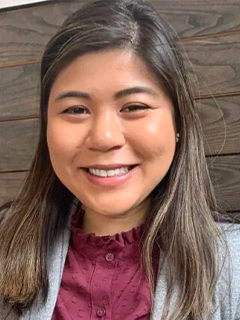HOW CAN WE HELP YOU? Call 1-800-TRY-CHOP
In This Section
Supporting Marginalized Youth: Q&A With Diversity Fellow April J. Ancheta, PhD, RN

Diversity Fellow April J. Ancheta, PhD, RN, is focused on helping school nurses improve healthcare disparities among marginalized youth communities.
Diversity and inclusion are critical drivers to our breakthroughs at Children's Hospital of Philadelphia Research Institute. Fostering a community of scientists from unique backgrounds and academic experiences enables collaboration to meet challenging pediatric problems from a variety of perspectives. In a Q&A series in the coming months, we’re featuring five new scholars in the Postdoctoral Research Fellowship for Academic Diversity program at CHOP.
Applications for the next group of Diversity Fellows are due Jan. 30, 2024! Visit the Postdoctoral Research Fellowship for Academic Diversity page for complete eligibility requirements and application procedures. Submit your application via REDCap.
As a key part of CHOP's commitment to diversity, this fellowship funds talented researchers and educators from different backgrounds, races, ethnic groups, and other diverse populations. Join us to meet these fellows, learn more about their research interests, what diversity in science means to them, and how they enjoy spending their time outside of work. Our final featured Diversity Fellow is April J. Ancheta, PhD, RN, a postdoctoral fellow in the National Clinical Scholars Program who is excited to further her research into the effects of social- and school-based policies on LGBTQ youth.

Diversity Fellow April J. Ancheta, PhD, RN
Tell us about your background and what compelled you to apply for the Postdoctoral Research Fellowship for Academic Diversity?
I applied for the Postdoctoral Research Fellowship for Academic Diversity because I saw the value in being connected to a hospital system to advance my research with the help of my mentor, Nadia Dowshen, MD, MSHP. The proximity to patients and being able to learn from them and other investigators/clinicians, appealed to me. This opportunity is a postdoc experience unique to CHOP, especially for nurse researchers like me. I also wanted to be part of a cohort of other postdoc investigators from diverse backgrounds.
I am a clinician and registered nurse by training and practiced for several years in a variety of inpatient settings before returning to graduate school to obtain my PhD in Nursing from Columbia University. My dissertation and predoctoral work focused on school and social policy contributors to violence victimization and weight disparities among LGBTQ adolescents. We know that structural stigma — the societal-level conditions, norms, and policies that constrain the opportunities and well-being of the stigmatized — is pervasive in nearly every health and social system with which LGBTQ people interface. I have an inherent interest in how policy impacts health, and examined how school and social policies act to either disrupt or perpetuate this stigma and ultimately affect health disparities.
What does diversity in research and science mean to you?
Diversity in research and science means uniqueness of thought. It means the ability to bring lived experience to your research and to appreciate how it impacts your research questions and those with whom you choose to collaborate. Diversity brings a different flavor and way of perceiving and moving through the academic world. And lastly, it brings a sense of community and belonging. Despite being in completely different research worlds, all postdocs in this program share connection in how our identities have shaped, changed, and challenged the way we approach the health problems we seek to answer.
What do you like the most about the Research Institute regarding inclusivity?
I like that inclusivity here feels intentional and organic, and that all starts with leadership. From seeing diversity in leadership to offering programming that is specific to promoting postdoc diversity in science — that goes a long way to foster inclusivity and sense of belonging.
What are some research projects that you’re excited about?
My main project is an examination of the knowledge, attitudes, and practices of school nurses in caring for LGBTQ youth. Although largely descriptive in nature, this study will be the first to characterize school nurses across the country and the role they potentially play as advocates for LGBTQ youth. School nurses were thrust into the forefront as critical public health professionals that care for our children and adolescents during the COVID-19 pandemic. At the same time, policies that explicitly seek to target and marginalize LGBTQ youth also have been highlighted in national conversations. This study seeks to leverage this combined public interest and address a gap in the literature on how school nurses function in providing quality care in the midst of unsupportive policies.
I am also involved in other projects with CHOP investigators who seek to explore sexual and reproductive healthcare among transgender and gender diverse youth of color.
What inspired you to choose your research focus/specialty? And what do you aim to achieve with your research?
I have always been people-focused, which is why I went into nursing school. Making a career of taking care of others during their most vulnerable times and connecting with individuals on a meaningful level has always been attractive to me. However, as I continued to practice bedside nursing in New York City and witnessed the health disparities that marginalized communities faced, such as the LGBTQ community, I was truly inspired to go back to school to learn more about what nurses can do to help improve these disparities.
What are the underlying mechanisms for why LGBTQ adolescents are more likely to experience violence victimization and have increased rates of mental and physical health issues? Why don’t nurses know enough about these issues to provide competent and affirming care? How can members of the profession be active allies instead of bystanders in combatting the ongoing acts of oppression that LGBTQ people face? My postdoc work and beyond aims to answer these questions for the nursing profession to help inform and lead to better training and more understanding for nurses who work in a variety of settings. I also hope my work ultimately helps inform appropriate school policies that improve school climate for youth.
When you’re not working, do you have a favorite pastime or spot to relax, enjoy a meal, or be active?
If I’m not working, you can most likely find me at a local concert venue. I love live music and hearing how a track with a lot of synth and bass can come to life and transform with live instruments. Huge stadiums are fun, but I appreciate the grittiness and intimacy of smaller venues where you can feel the music and see the artist and the band smile and laugh. I also enjoy growing my vinyl record and queer art collections. Taking walks along the Schuylkill River is always calming, and I am on a mission to try every good sushi place in the city.


